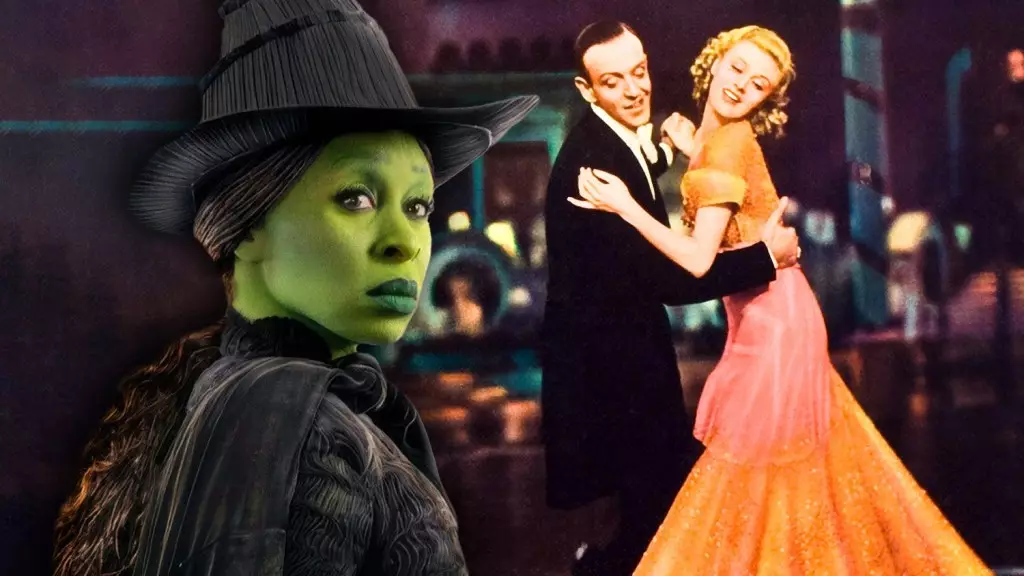The resurgence of musicals in recent years has captivated audiences, not just as a form of entertainment but also as a cultural commentary that mirrors our evolving sensibilities. With the shadows of the pandemic still lingering in our collective memory, many turned to the past — classic MGM musicals, where joy seemed boundless, offered a welcomed escape. However, the current crop of musicals, while enjoying commercial success and critical accolades, paints a more intricate and, at times, somber picture that reflects the complexities of modern life.
Gone are the days when musicals solely provided a sanctuary of joy characterized by catchy songs and whimsical plots. Today’s productions are laden with emotional depth and nuance, often exploring themes of identity, conflict, and societal expectations. The new wave of musicals, ranging from adaptations to original works, is characterized by a tonal shift from sheer exuberance to an exploration of the human condition. The charm of Gene Kelly’s “Singing in the Rain” may resonate in spirit, but contemporary narratives elicit a more profound contemplation of the characters’ struggles and triumphs.
As box office numbers for films like “Wicked,” which raked in over $500 million, suggest, musicals have successfully reestablished their foothold in the entertainment industry. This success does not come without a more complex backdrop. Modern musicals cater to audiences that appreciate depth, resulting in characters that are more relatable and, ultimately, more human. The sheer personas portrayed by timeless icons like Fred Astaire now give way to characters grappling with their existence and societal dilemmas.
Modern musicals boast protagonists who find themselves entrenched in intricate webs of confusion and complexity. For instance, Timothée Chalamet’s portrayal of Bob Dylan in the upcoming film showcases a character who is anything but straightforward; it unearths the struggles of an artist attempting to carve out an identity amid societal expectations and internal contradictions. Dylan’s rejection of conventional norms during the 1965 Newport Jazz Festival serves as a pivotal moment not only in his career but in the landscape of music itself, encapsulating the challenges of self-expression in a world inclined to impose definitions.
In stark contrast, the characters in classic musicals, like Ginger Rogers’s heiress in “Top Hat,” often navigated lighthearted escapades devoid of real-world concerns. The modern counterparts faced significant obstacles, as seen in Angelina Jolie’s portrayal of Maria Callas in her later years — a woman confronting the harsh realities of fame, loss, and diminishing power. These narratives resonate deeply in our lives, reflecting the complexities and struggles that define contemporary existence.
In the current landscape, songs have evolved into instruments of storytelling that encapsulate emotional truths and societal issues. The musicality of films like “Emilia Pérez,” with its portrayal of characters grappling with relationships intertwined with a Mexican cartel, demonstrates how songs serve as vehicles to explore identity and transformation. Unlike the carefree melodies of old, today’s music lives in the shadows of personal and collective trials, reminding us of the chaos and beauty that life brings.
Furthermore, as seen in contributions from stars like Selena Gomez and Ariana Grande, music transcends entertainment, becoming a universal language for expressing vulnerabilities and aspirations that resonate with diverse audiences. This shift has paved the way for a new generation of musicals that do not shy away from exploring darker themes while balancing moments of levity.
While the past offered gleeful escapism, contemporary musicals embrace a richer tapestry of human experiences — complex narratives wrapped in melodic elegance. As we emerge from uncertain times, the genre’s evolution invites audiences to explore the depths of their stories, reflecting our struggles and triumphs through unified and heartfelt performances.
Ultimately, the triumph of modern musicals lies in their ability to blend artistry with an authentic portrayal of life. The accolades and commercial success enjoyed by films like “Wicked” affirm that while we may still hum the tunes of old, our souls seek stories that resonate with the rich complexity of contemporary existence. Musicals will continue to thrive, not simply as a form of entertainment but as a vital, evolving art form that speaks to the very heart of what it means to be human in a changing world.

